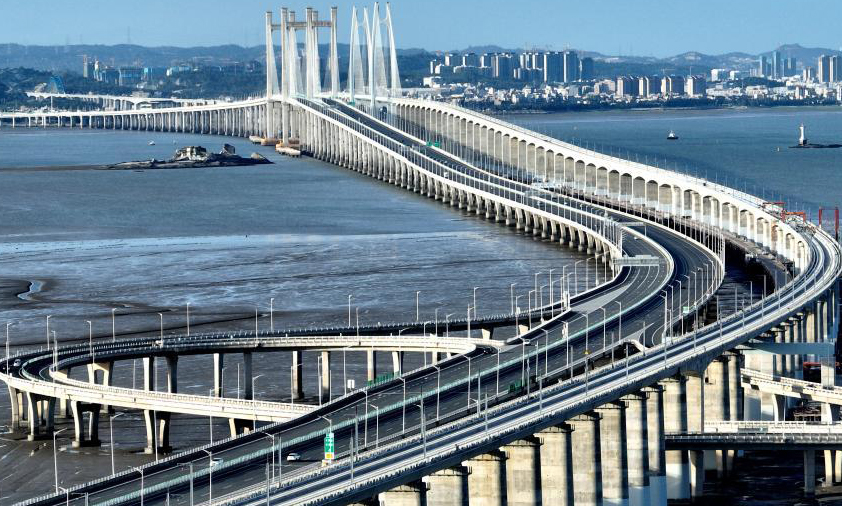Is U.S. economy already in a recession?
WASHINGTON, July 9 (Xinhua) -- As the Federal Reserve strives to rein in the worst inflation in four decades, a closely followed gauge indicated that the U.S. economy might have contracted in the second quarter, after a decline in the previous quarter.
Some economists believed that the economy is already in a recession, as two consecutive quarters of negative economic growth meet the technical definition. Others, meanwhile, argued that a recession might come a few months later.
The U.S. economy is estimated to have shrunk at an annual rate of 1.2 percent in the second quarter, according to the Federal Reserve Bank of Atlanta's GDPNow model updated Friday. The first-quarter gross domestic product (GDP) declined by 1.6 percent.
Investment guru and Ark Invest CEO Cathie Wood is among those who said that the country is already in an economic downturn.
"We think we are in a recession," Wood said in a recent interview with CNBC. "We think a big problem out there is inventories... the increase of which I've never seen this large in my career."
According to the Institute for Supply Management (ISM), the U.S. manufacturing sector saw slower growth in June amid continued supply chain bottlenecks and an elevated inflation, with the Purchasing Managers' Index (PMI) standing at 53 percent, down 3.1 percentage points from the May reading.
"We are hearing from customers that their inventories are high, and sales are coming down. We expect orders to decline in the coming months until inventories are leveled properly against demand," said a business executive from the Apparel, Leather & Allied Products industry.
The U.S. services sector also posted a slower growth in June than the previous month, the latest ISM data showed. "The message from the June ISM report is that service activity is cooling rather than buckling," Tim Quinlan and Shannon Seery, economists at Wells Fargo Securities, said in an analysis.
"As the Atlanta Fed's GDPNow estimates suggest, it is very possible that we will have a negative second quarter GDP growth. That will make it two negative quarters in a row which is the popular definition of a recession," Desmond Lachman, senior fellow at the American Enterprise Institute and a former official at the International Monetary Fund (IMF), told Xinhua.
Lachman, however, noted that the official determination as to whether the country has a recession is made by the National Bureau of Economic Research which they do "only after a few months' delay."
The U.S. National Bureau of Economic Research's definition of a recession emphasizes that a recession involves "a significant decline" in economic activity that is "spread across the economy" and "lasts more than a few months."
"With the labor market still strong, I am not sure that the NBER will rush to say that we are in a recession," Lachman said.
U.S. employers added 372,000 jobs in June amid continued labor market tightness, with the unemployment rate unchanged at 3.6 percent, slightly above the pre-pandemic level, the Labor Department reported on Friday.
"The U.S. employment report for June continues to show a strong labor market that is consistent with a strong economy with moderating inflationary pressures," said an analysis published by think tank Peterson Institute for International Economics (PIIE).
PIIE senior fellow and Harvard professor Jason Furman and Harvard Kennedy School research associate Wilson Powell wrote that "the one discordant note in the June data was a decline in labor force participation." It dropped to 62.2 percent, below the pre-pandemic level of 63.4 percent.
Furman and Powell, however, noted that "if one looks outside of the labor market, other economic data are telling a worrisome story of an economy that could be entering into recession" even while the underlying inflation rate remains very high.
Many economists believe that with high inflation and low unemployment, it's just a matter of time before the Fed's more hawkish stance plunges the U.S. economy into a recession.
"If they raise the projected terminal rate of this hiking cycle from around 3 percent to more than 4 percent, that indicates that they may need a recession to bring down inflation," PIIE President Adam Posen recently told Xinhua.
The U.S. economy will tip into a recession next year, according to nearly 70 percent of leading academic economists polled by the Financial Times, in partnership with the Initiative on Global Markets at the University of Chicago's Booth School of Business.
A recession is "inevitable" within the next 12 to 18 months, former President of the Federal Reserve Bank of New York Bill Dudley wrote in a recent Bloomberg opinion piece.
"I very much expect a recession. I think that the Fed is being too hawkish at a time when the economy is already slowing and when financial markets are in trouble," Lachman told Xinhua.
The so-called yield inversion -- when the yield on two-year Treasury bonds exceeds the 10-year yields -- has now happened again, Lachman said, noting that it's a very reliable forward indicator of a recession.
"My expectation is that we will have a meaningful recession by the end of this year or the beginning of next year," he said.
Photos
Copyright © 2022 People's Daily Online. All Rights Reserved.









